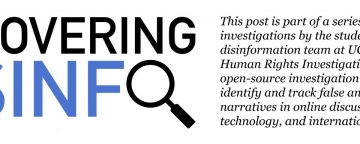Heather AlexanderBlockedUnblockFollowFollowingNov 29
It’s hot and you’re scared. You’ve been travelling for months with your children as part of a migrant caravan to get to the United States. The organizers of the caravan told you it would be a free, safe, legal way to get your family to the US border, where you could claim asylum through the proper channels.
But now that you’re here, everyone is saying that there will be no asylum in the US after all. Rumors are spreading that you will have to wait in Mexico, maybe for years. People are saying that the caravan was a mistake, it’s too high profile and no one will get asylum because the US government has closed the border. Some of the other migrants are talking about going back and trying to get to the US by a different, quieter route. You hear that there is an organization called “IOM” that will pay you money, a lot of money, to go back. Maybe once you are home, you can use this money to pay a real smuggler to take you across the border.
Someone directs you towards the “IOM” tent. Inside, a kind woman tells you that there will be no asylum for anyone from the caravan. The US is not going to let you in and the Mexican government is not going to let you stay here. But if you sign this piece of paper, IOM will give you money and a free flight back to your country. And, even better, if you stay there for three months, you will get yet more money. The woman urges you not to sit here in Mexico watching your chances dwindle away. She tells you to make the smart choice. And then she holds out a piece of paper for you to sign. On this piece of paper is written a sum of money…
This morning I woke up to a WaPo article stating that the International Organization of Migration had set up one of their bribery tents, as I call them, in Mexico. The reporter seemed shocked that people might “choose to return” after traveling so far to claim asylum. She did not seem aware of the fact that money is changing hands.
IOM runs what they call their global “assisted voluntary return program,” which essentially bribes people into accepting deportation so that donor governments like the US and EU don’t have to do it. The problems with this program are well documented and stretch back years.
Yet key pieces of information about this program are not widely known. How much money are migrants being given? After being deported, how many actually stay long term, in their countries? Such information does not appear in IOM reports. Instead, heartwarming deportation stories fill IOM’s annual reports. Ok so fine, you might think, people are being paid to go back. So what.
But when you accept “voluntary return” through and IOM program, you may be waiving your right to make a future asylum claim. Is IOM making this risk clear to asylum-seekers at the US border?
Why Go Back?

As a spokesperson from IOM told WaPo;
“They make the decision (to return) for a variety of reasons,” said Ivonne Aguirre, a program coordinator with the International Organization for Migration (IOM), which is assisting migrants with returning home. “Some have sick relatives, some miss their families, some are surprised by the conditions here, which are not what they imagined.”
Notice she didn’t say anything about the money.
In actual fact, IOM bribes migrants to go back. It then pays them again if they stay in their home country for 3 months.
In Eastern Europe, I have met migrants who have been deported from Western Europe multiple times through this program, using the grant money to pay smugglers to take them back over and over again. They will keep trying because there is nothing for them at home and they have a job waiting for them in Germany or Sweden. This process is fueling a multi-billion dollar smuggling industry run by international criminal cartels.
This is my tax dollars at work. This is the “handle on migration” Hillary Clinton spoke of. Instead of using this money to fix climate change, we are paying millions to criminal smugglers, not to mention billions to a constellation of companies who produce retinal scanning equipment, border control guards, airplanes and ships, detention centers and a host of other commodities in the global migration management industry.
How much money do migrants get paid to go back? This is difficult information to get out of IOM, but in West Africa it’s $300 to get on the plane and possibly another $1,000 if you stay in your country for 3 months following your deportation. In Greece and Niger, IOM is just one cog in the wheel of a multi-million dollar interception, detention and deportation program used to stop people from reaching the EU. Obviously, these programs must look very attractive to the US government right about now. But note that IOM programs only account for a fraction of the true cost of deportation.
And how does IOM feel about all this? Well, they go to sleep every night on a huge, soft cushion of donor money. IOM’s budget is now close to $1 billion dollars. Now, much of IOM’s budget goes towards much needed humanitarian response programs, including assisting with refugee resettlement and return in cooperation with UNHCR. But that said, the budget for migrant deportation has jumped by $50 million to just under a whopping $250 million for 2018.
The Problem with Letting IOM Deport You
What does all this mean for Central American migrants as individual people facing tough decisions? Know that when you choose to take part in an IOM deportation process, your information is being logged with IOM and shared with governments. IOM has stepped up their cooperation with biometrics screening and you will probably be registered as part of “assisted return.” How will this information be used in the future?
Every person in the migrant caravan should be aware of the following:
“IOM provides technical assistance to government officials and trains them to assess, improve and upgrade their migration management operational systems, for example in the areas of travel document issuance, data systems development and border management technologies, including data
capture and biometrics. It implements programmes to facilitate the assisted voluntary return of unsuccessful asylum seekers, stranded persons and other migrants, and to support their reintegration in their countries of origin, with due regard for the needs of the migrants themselves and the concerns of
local communities.”
In essence, by agreeing to voluntary return before you have had a chance to claim asylum, you may be waiving your right to asylum in the future. Asylum courts have in the past stated that voluntary return to your country of origin weakens an asylum claim. IOM may tell you this is a “myth,” but in truth, they have no control over the US asylum system. They cannot give you any guarantees about how return might affect your future asylum claim. Because of this, make no mistake, being deported by IOM could jeopardize any asylum claim you might try to make in the future no matter what IOM says.
Globally, it is not yet clear how the information IOM gathers on returnees will be used. In Europe, the EU is aggressively using fingerprints and facial recognition software to identify and remove repeat asylum-seekers, people’s whose claims have already been rejected. I am not sure how information on “assisted returns” will be used in first time asylum claims.
Maybe a smart journalist can go and uncover this information.


























Connect with us